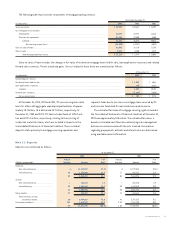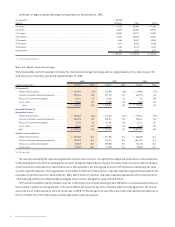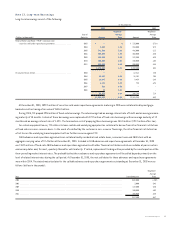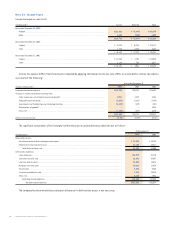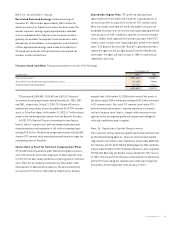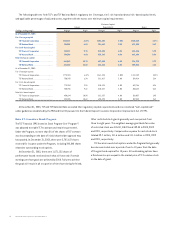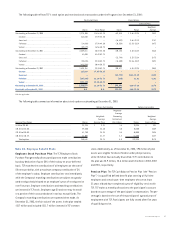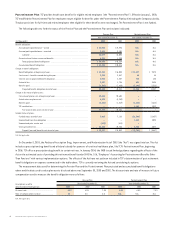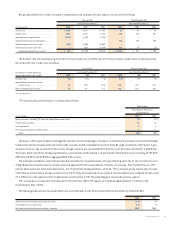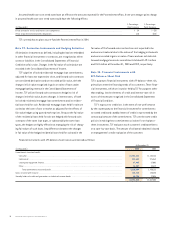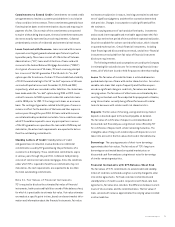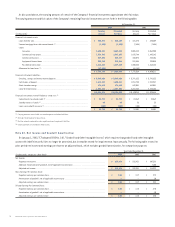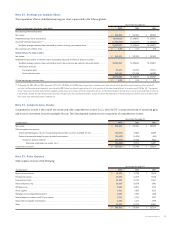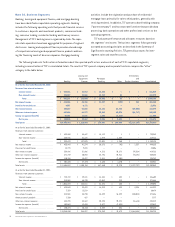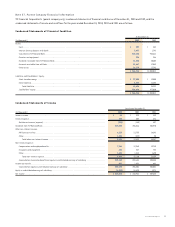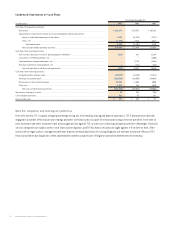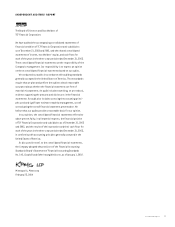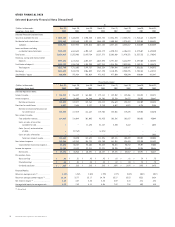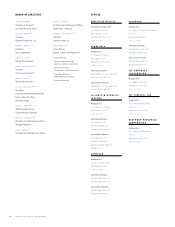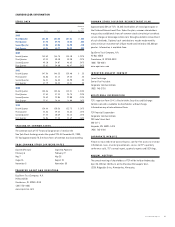TCF Bank 2003 Annual Report Download - page 73
Download and view the complete annual report
Please find page 73 of the 2003 TCF Bank annual report below. You can navigate through the pages in the report by either clicking on the pages listed below, or by using the keyword search tool below to find specific information within the annual report.
2003 Annual Report 71
Commitments to Extend Credit Commitments to extend credit
are agreements to lend to a customer provided there is no violation
of any condition in the contract. These commitments generally have
fixed expiration dates or other termination clauses and may require
payment of a fee. Since certain of the commitments are expected
to expire without being drawn upon, the total commitment amounts
do not necessarily represent future cash requirements. Collateral
predominantly consists of residential and commercial real estate.
Loans Serviced with Recourse Loans serviced with recourse
represent a contingent guarantee based upon failure to perform
by another party. These loans consist of $126 million of Veterans
Administration (“VA”) loans and $4.8 million of loans sold with
recourse to the Federal National Mortgage Association (“FNMA”).
As is typical of a servicer of VA loans, TCF must cover any principal
loss in excess of the VA’s guarantee if the VA elects its “no-bid”
option upon the foreclosure of a loan. TCF has established a liability
of $100 thousand relating to this VA “no-bid” exposure on VA loans
serviced with partial recourse at December 31, 2003 and 2002,
respectively, which was recorded in other liabilities. No claims have
been made under the “no-bid” option during 2003 or 2002. Loans
sold with recourse to FNMA represent residential real estate loans
sold to FNMA prior to 1982. TCF no longer sells loans on a recourse
basis. The contingent guarantee related to both types of recourse
remains in effect for the duration of the loans and thus expires in
various years through the year 2033. All loans sold with recourse
are collateralized by residential real estate. Since conditions under
which TCF would be required to cover any principal loss in excess
of the VA’s guarantee or repurchase the loan sold to FNMA may not
materialize, the actual cash requirements are expected to be less
than the outstanding commitments.
Standby Letters of Credit Standby letters of credit
and guarantees on industrial revenue bonds are conditional
commitments issued by TCF guaranteeing the performance of a
customer to a third party. These conditional commitments expire
in various years through the year 2011. Collateral held primarily
consists of commercial real estate mortgages. Since the conditions
under which TCF is required to fund these commitments may not
materialize, the cash requirements are expected to be less than
the total outstanding commitments.
Note 21. Fair Values of Financial Instruments
TCF is required to disclose the estimated fair value of financial
instruments, both assets and liabilities on and off the balance sheet,
for which it is practicable to estimate fair value. Fair value estimates
are made at a specific point in time, based on relevant market infor-
mation and information about the financial instruments. Fair value
estimates are subjective in nature, involving uncertainties and mat-
ters of significant judgment, and therefore cannot be determined
with precision. Changes in assumptions could significantly affect
the estimates.
The carrying amounts of cash and due from banks, investments
and accrued interest payable and receivable approximate their fair
values due to the short period of time until their expected realization.
Securities available for sale are carried at fair value, which is based
on quoted market prices. Certain financial instruments, including
lease financings and discounted lease rentals, and all non-financial
instruments are excluded from fair value of financial instrument
disclosure requirements.
The following methods and assumptions are used by the Company
in estimating fair value disclosures for its remaining financial instru-
ments, all of which are issued or held for purposes other than trading.
Loans The fair value of residential loans is estimated based on
quoted market prices of loans with similar characteristics. For certain
variable-rate loans that reprice frequently and that have experi-
enced no significant change in credit risk, fair values are based on
carrying values. The fair values of other loans are estimated by dis-
counting contractual cash flows adjusted for prepayment estimates,
using interest rates currently being offered for loans with similar
terms to borrowers with similar credit risk characteristics.
Deposits The fair value of checking, savings and money market
deposits is deemed equal to the amount payable on demand.
The fair value of certificates of deposit is estimated based on
discounted cash flow analyses using interest rates offered by TCF
for certificates of deposit with similar remaining maturities. The
intangible value of long-term relationships with depositors is not
taken into account in the fair values disclosed in the table below.
Borrowings The carrying amounts of short-term borrowings
approximate their fair values. The fair values of TCF’s long-term
borrowings are estimated based on quoted market prices or
discounted cash flow analyses using interest rates for borrowings
of similar remaining maturities.
Financial Instruments with Off-Balance-Sheet Risk
The fair values of TCF’s commitments to extend credit and standby
letters of credit are estimated using fees currently charged to enter
into similar agreements. For fixed-rate loan commitments and
standby letters of credit issued in conjunction with fixed-rate loan
agreements, fair value also considers the difference between current
levels of interest rates and the committed rates. The fair value of
loans serviced with recourse approximates the carrying value recorded
in other liabilities.


